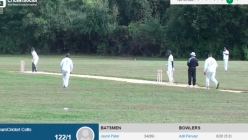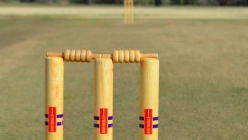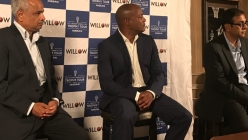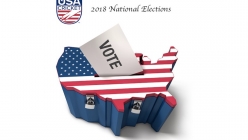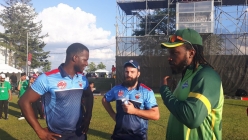USA Cricket: Tenth Anniversary of Gladstone Dainty's Presidency - Review [Part 1]
2013 Jun 04 by DreamCricket USA
Ultimately, leadership is best measured by results. In this series, I am going to examine USACA's record under his leadership in five key areas - on field performance, growth as measured by player participation and corporate sponsorships, governance, planning and delivery, and creation of infrastructural foundations.
Now, you can get all the USA Cricket updates via Facebook. Also follow us on Twitter via @dreamcricket
By Venu Palaparthi
This month marks the tenth anniversary of Gladstone Dainty’s reign as president of USACA. It was on June 4, 2003 that Gladstone Dainty was elected president for the first time.
After a decade in charge, now is a good time for all of us to reflect on this milestone. Without a doubt, Dainty has given a lot of his time to cricket during this period and dealt with many crises. At the same time, his years in office have been riddled with controversy.
If I had to choose two words to summarize his impact on cricket, they would be: unrealized potential.
.jpg) Still, Dainty has had an incredibly long ride in the driver's seat. His opponents cite the lack of term limits as the reason for his extended reign. His acolytes disagree and offer up that elections serve as automatic term limits. They are proud of Dainty's record - he has never lost an election in ten years, they suggest, a reflection of his great contributions.
Still, Dainty has had an incredibly long ride in the driver's seat. His opponents cite the lack of term limits as the reason for his extended reign. His acolytes disagree and offer up that elections serve as automatic term limits. They are proud of Dainty's record - he has never lost an election in ten years, they suggest, a reflection of his great contributions.
Dainty is a polarizing figure. His detractors call him a dictator. His supporters are fans of his domineering style, which they say is the perfect antidote to the 'crab mentality' that prevails in USA cricket.
And yet, given the controversy that has surrounded USACA's last three elections, it would be extremely charitable to attribute his decade-long hold over USACA to broad-based popularity.
Dainty got more votes in the 2008 election than the total number of leagues that were permitted to vote in 2012. Dainty is not affected by low approval ratings. He simply doesn't care.
In 2007, when asked how he felt about the amount of flack he had to weather, Dainty told Martin Williamson of Cricinfo: "It hurts but the pain I feel will not compromise my strength. It is not about me, it is about the game of cricket and the necessity for progress. I have seen outstanding citizens driven away. I do not run."
Dainty has survived thanks to the unquestioned loyalty of a small circle of friends and the ad hoc support of a few others who gravitate towards him from time to time for political reasons. The ones you read and hear about most are his opponents. Over time, this group has grown in number, but they have been politically incapacitated, even ostrasized.
But it is his circle of friends that form an unwavering support base. Loyal and protected, these are the president’s men. Like him, these are folks who have spent many years in regional or national administration. Several of them have made notable contributions to cricket in the USA, but these are gentlemen who are clearly past their shelf life. They are the coterie, the support system for Dainty.
Take "Chik" Masood Akhtar Syed, for example. Masood has been involved with cricket since 1972 and is an ICC Centenary Award recipient and USA Cricket Hall of Fame inductee. Masood played for USA, is widely acknowledged as having contributed greatly to cricket's growth in Chicago during that region's cricketing renaissance. Fittingly, he was elected Central East Representative back in 1987. In 1996, he became the president of USACA.
The trouble is that instead of mentoring a new generation of volunteers and passing the baton, he stayed on. And on. And on.
In fact, Masood was the physio of the US team for most of the last decade. He was on the national selection committee from 2000 to 2004 and first became the Central East Region's representative to the USACA board in 2000, a position he continued to hold, somewhat controversially, even though his region elected to recall him in a spectacular 10-0 vote in July of 2011.
Why do people like Masood play such an oversized role in USA cricket affairs? It doesn't take a genius to figure out that it is because of their unquestioning loyalty to the president. Some call it sycophancy.
Sample this. Masood told DreamCricket.com in 2009: "Since Gladstone took over as president cricket has progressed at all levels and extended in all directions. Now we have regional and national tournaments. Despite all monetary difficulties and other friction, he never stops and continues to have national and international tournaments and tours of all levels each year." The Nation wrote that '[Chik Masood] has formed a close relationship with USACA President Gladstone Dainty and the two work as a team for the improvement of cricket in the US.'
Dainty is known to stand by those who stand by him. And he is dismissive of his critics and detractors. When asked what he thought of the criticism that USACA had lurched from crisis to crisis under his leadership, Dainty told Williamson: "The efforts of outstanding individuals have been undermined long before my time." In Dainty's world, he is an outstanding individual on a mission and others are troublemakers.
Dainty is not big on PR and prefers not to engage with the media. From time to time, especially ahead of elections and during AGMs, he breaks his silence proclaiming that his objective is to "develop and improve the quality of cricket in USA." That "USA cricket will explode into life." That "future seems very bright." Or that USACA is becoming more purposeful and is moving rapidly in a positive direction “by empowering more stakeholders.”
Ultimately, leadership is best measured by results. In this series, I am going to examine USACA's record under his leadership in five key areas - on field performance, growth as measured by player participation and corporate sponsorships, governance, planning and delivery, and creation of infrastructural foundations.
In this first article, I am going to review USA's on field performance during his tenure.
When Dainty took over as President, there was a fair amount of optimism surrounding American cricket. USA won the ICC Americas championship in 2002 and at that point they were 13th in the ICC’s ODI rankings. Today, they are ranked 23rd.
No other team that was similarly positioned in 2002 has fared so poorly over the last 10 years. USA's biggest success on the world stage came in 2004 right after Dainty became president. That March, USA won the ICC Six Nations Challenge. The tournament featured USA, Canada, Namibia, Netherlands, Scotland and the UAE. The winner would join Kenya as the only two Associate teams taking part in the ICC Champions Trophy that September in England. USA defeated Namibia by five wickets and Canada by six wickets before a dramatic five-wicket win over Scotland on the final day of the tournament clinched first place for USA.
All five nations that USA finished ahead of in the 2004 ICC Six Nations Challenge are now ranked above USA.
Throughout Dainty’s tenure, USACA has lacked a focused strategy to achieve the prized ODI status. It has been a case of one step forward, two steps back. Two times, in 2005 and 2007, the team’s progress was also impacted by internal strife and USACA’s suspension by ICC for governance issues. After participating in the inaugural edition of the ICC Intercontinental Cup multi-day cricket competition for Associates in 2004, USA was kicked out of the 2005 edition while under suspension and has not appeared in the Intercontinental Cup since. In 2007, USA was due to participate in ICC World Cricket League Division Three in Darwin, Australia. Due to suspension, they were replaced by Argentina. In the process, USA was dropped from Division Three to Division Five. Things have been no better since the suspension was lifted.
Hurriedly convened teams and inconsistent selection have been blamed. But ultimately, the main reason was inadequate high-level practice. USA has been unable to meet the minimum standard in this area.
In 2008, after USA failed to advance from Division Five, USA captain Steve Massiah blamed the results on lack of practice. “We had one weekend together in Florida where it was only net sessions, and where four players were missing.”
“Those other teams were preparing for months and weeks and had warm up games in Pakistan and India,” Massiah told DreamCricket.
Four years later, in 2012, the story was no different. Following the ICC World Twenty20 Qualifier, Peter Della Penna wrote: “The administration failed to prepare the team for this tournament and as a result the team was prepared to fail. In the seven and a half months that followed USA’s second place finish at the ICC Americas Division One Twenty20 tournament in July, next to nothing was done.”
“[T]he coaching staff was trialing combinations and roles during the tournament rather than ahead of the tournament. It cost the team badly.”
Sadly, 2013 has been no different. The very gifted allrounder, Timroy Allen, had this to say as he announced his retirement on Monday: "If you’re gonna pick a team to go on tour, I think that team is gonna need the practice. You’re not just gonna play a couple of games with a totally different team and then you bring in another team to play two or three matches. That doesn’t make any sense."
"You can’t tell me you’re gonna pick us up from work to play five or six games of 50-over cricket and think natural ability is just gonna bring us through," Allen told DreamCricket.
In the end, two words come to mind when assessing Dainty's impact over the last decade on this very important measure of performance. The same two words: unrealized potential.
In my next piece, I will examine Dainty's record on achieving growth in participation both in terms of membership and in terms of sponsorship.
[Opinions expressed in this article are those of the author. We welcome your opinions. If you would like to send in your opinions for publication, please contact content@dreamcricket.com]
